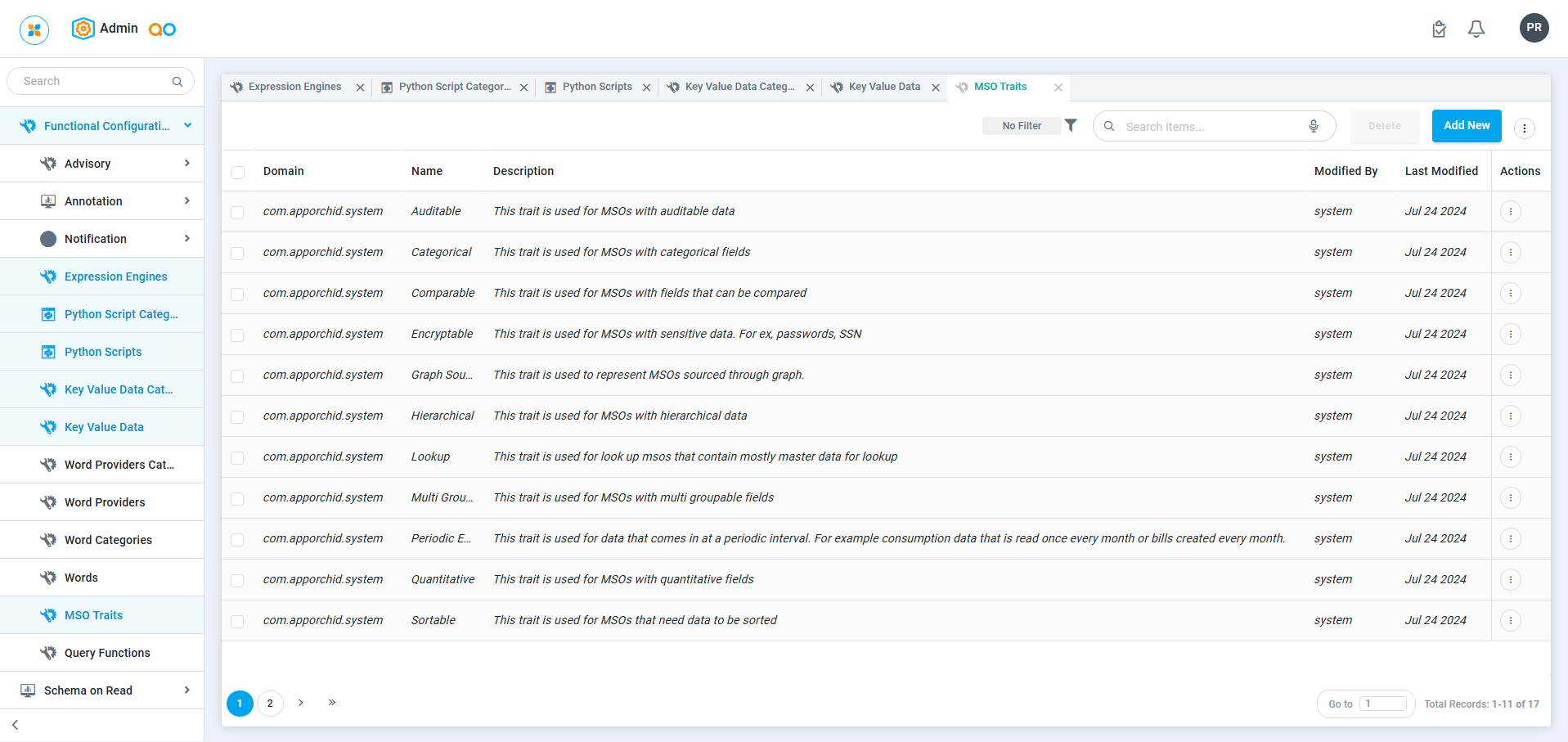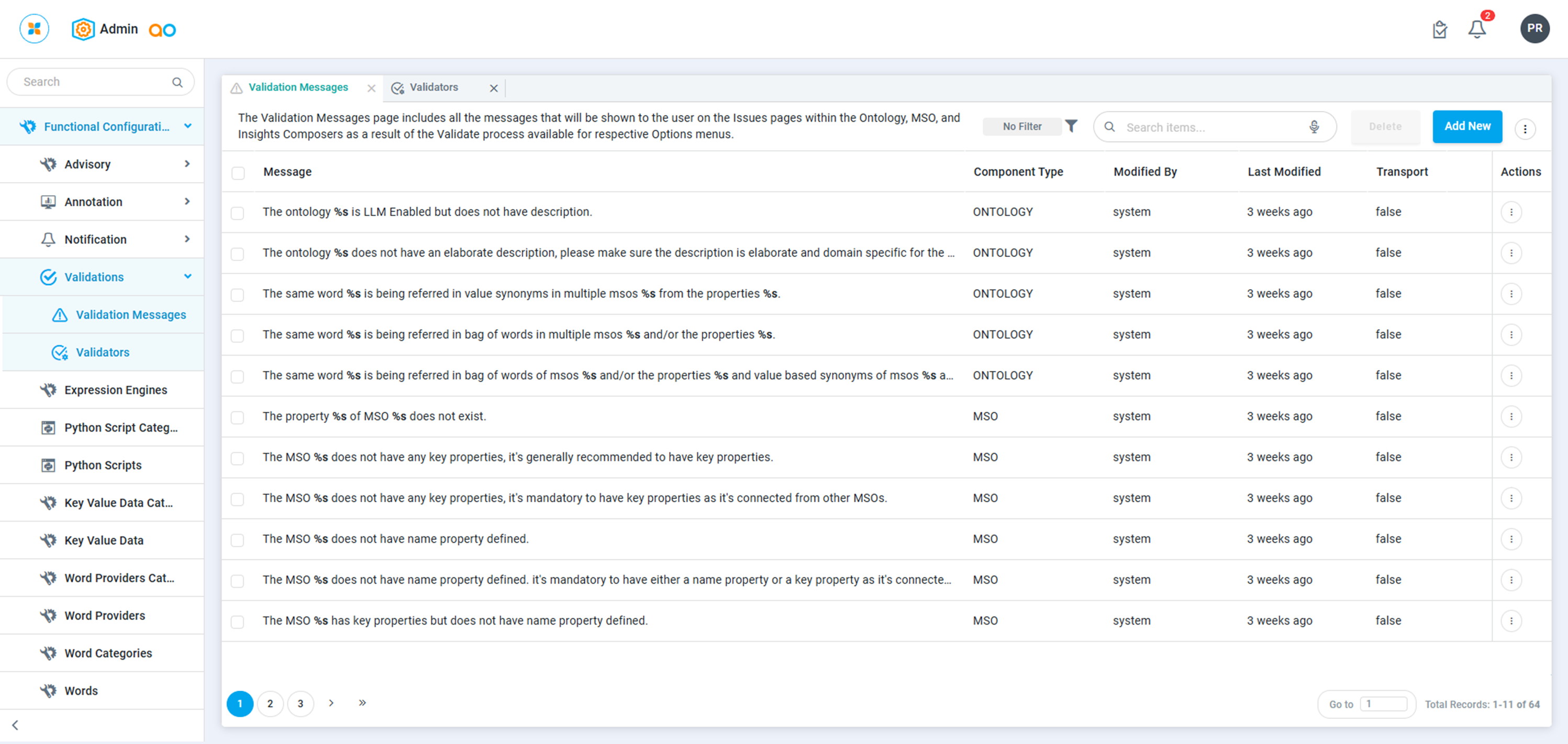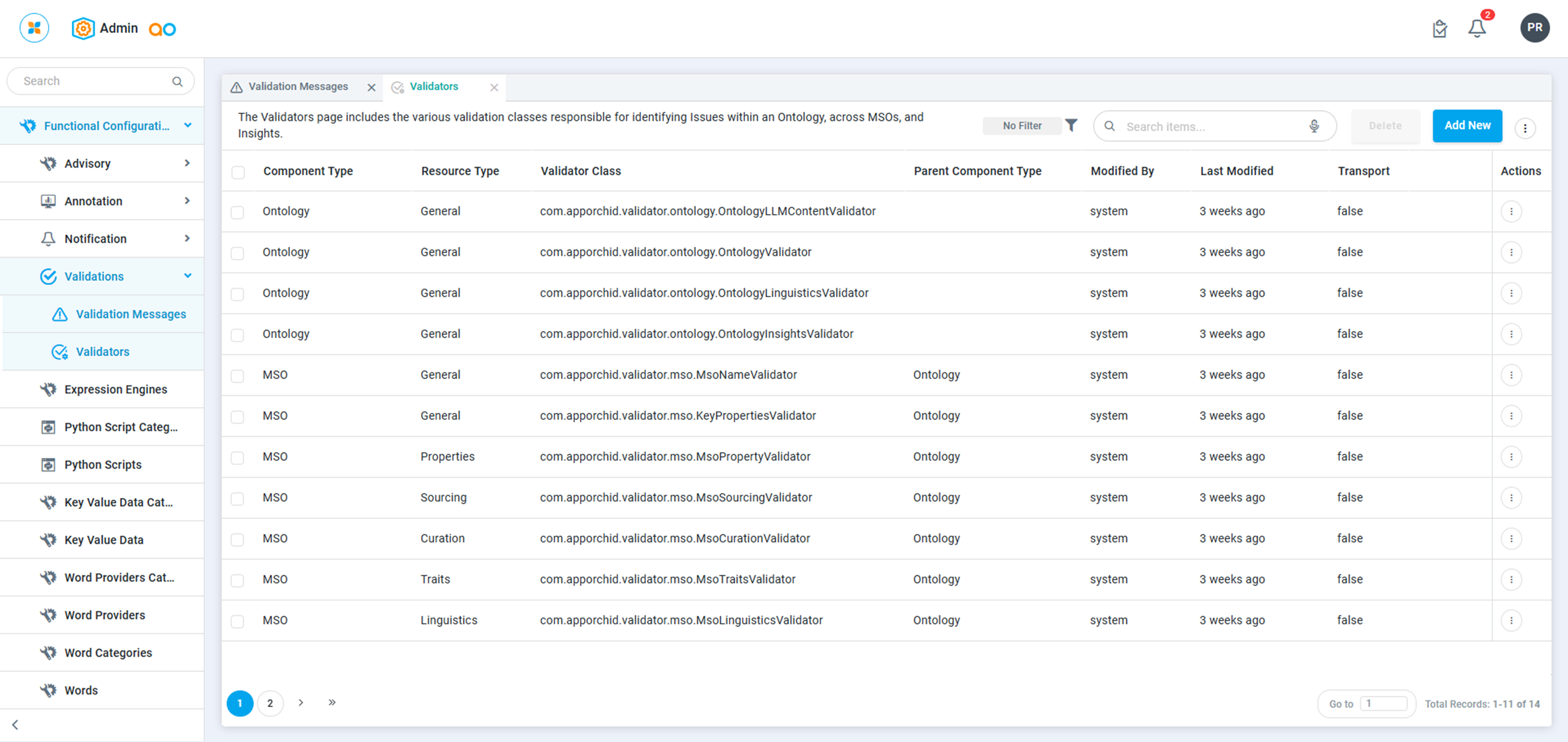Intended audience: developers administrators
AO Platform: 4.4
Overview
The Functional Configurations pages allow the user to configure options for a variety of different Functional specific components, including Advisory, Annotation, Notification, Expression Engines, Python Scripts, Key Value data,, Word Providers, MSO Traits, and Query Functions.
Most of the pages in this section offer the following general actions:
-
Search/Filter - use a search term to find an entry from existing configurations.
-
Delete - batch deletion of any/all selected items.
-
Add New - create a new entry on the page.
-
Refresh - refreshes the page.
-
Import from Excel - allows the provision to import the configuration of one or more entries of the selected configuration page.
-
Download Data - exports the content of the page to a CSV or Excel file.
-
Settings - allows configuration of which columns can be seen on the page.
-
Go to (or select by page number) - allows moving to another page in case of too many entries for one page.
Additionally, these are the actions on individual entries:
-
View - views the properties of an entry in read-only mode.
-
Edit - allows the properties of an entry to be edited.
-
Delete - deletes an entry.
-
Add to Transport - adds the configuration record to Transport.
-
View Categories - views the Python Scripts associated with the Python Script Category selected.
-
View Key Values - views the Key Value data associated with the Key Value Data Category selected.
-
View Word Providers - views the Word Providers for the Word Providers Category selected.
-
View Words - views the Words for the Word Category selected.
-
View Data Types - views the Data Types associated with the Query Function selected.

Advisory > Message Configurations
The Message Configurations page allows administrators to configure and manage advisory messages within the system. This Message Configuration includes a Name, Description, and Short and Long Message to be communicated when a certain Key/Advisory Code is “triggered” by the system, and secondly through which channel(s) the Message will be distributed, including: Publish to Kafka, Send Email, Publish to Pipeline, Log Error, and Publish to Usage Analytics.
Configuration details include properties in the following categories: General Help and Advisory Message.
Advisory > Messages
The Messages page includes the configured system-generated messages that provide notifications, warnings, or error alerts related to data sources, ontologies, or other functional configurations within the platform.
Configuration details include Advisory Message properties only.
Annotation > Manager
The Managers page displays a list of annotation manager configurations, defining how different annotation processors handle and process annotations.
Configuration details include properties in the following categories: Annotation Manager, General, and Annotation.
Annotation > Processor
The Processor page includes a list of the components responsible for handling and processing annotations within the AO Platform.
Configuration details include properties in the following categories: Annotation and General.
Notification > Types
The Types page includes configured types of Notifications, such as…
-
Content Repository Updates
-
Download Data Updates
-
Easy Answers Updates
-
Feedback Enrichment Updates
-
Ontology Discovery Updates
-
Quick Insight Feed Updates
-
Quick Insight Preview Job Updates
-
Quick Insight Updates
Configuration details include properties in the following categories: General and Notification Type.
Notification > Priorities
The Priorities page includes configured priorities for Notifications.
Configuration details include General properties only.
Notification > Routes
The Routes page includes configured routes for the distribution of Notifications, such as on-screen in a browser, etc…
Configuration details include Notification Route properties only.
Notification > Model
The Model page includes all the Notifications that have been sent by the system across the different Delivery Modes and by which User.
Configuration details include Notification properties only.
Validation > Validation Messages
The Validation Messages page includes all the messages that will be shown to the user on the Issues pages within the Ontology, MSO, and Insights Composers as a result of the Validate process available for respective Options menus.

Validation > Validators
The Validators page includes the various validation classes responsible for identifying Issues within an Ontology, across MSOs, and Insights.

Expression Engines
The Expression Engines page includes a list of the configured Expression Engines available in the AO Platform.
Configuration details include properties in the following categories: General and Expression Engine.
Python Script Categories
The Python Script Categories page includes a list of the Categories for Python Scripts available in the AO Platform. Select the View Scripts entry in the Options menu to see the Python Scripts associated with this Category.
Configuration details include properties in the following categories: General and Python Script Category.
Python Scripts
The Python Scripts page includes a list of the Python Scripts available in the AO Platform. Many Python Scripts delivered as default are read-only and cannot be modified, as critical for the running of some components in the AO Platform.
Configuration details include properties in the following categories: General and Python Script.
Key Value Data Categories
The Key Value Data Categories page includes a list of categories for some predefined Key-Value pairs that are typically used in lookups, eg. Countries with associated Country Codes.
To see the Key Value pairs that are associated with a given Category, select View Key Values from the Options menu.
Configuration details include General properties only.
Key Value Data
The Key Value Data page includes a list of all Key Value pairs.
Configuration details include properties in the following categories: General, Key Value Data, and Additional Properties.
Word Providers Categories
The Word Providers Categories page includes a list of the Word Provider buckets available in the AO Platform. These Word Providers buckets are available to the user during configuration of the MSO Linguistics page in the Ontology Composer. To view the Word Providers associated with a Word Providers Category, select the View Word Providers entry in the Options menu.
Configuration details include General properties.
Word Providers
The Word Providers page includes a list of the Word Providers associated with the Word Providers Categories. Word Providers are typically a group of words that are closely related, eg. Synonyms for a given term, such as Employee, or a collection of words, such as Currency Types or Symbols. A Word Provider contains Word Categories with actual Words.
Word Categories
The Word Categories page includes a list of the Word Categories available in the AO Platform. To view the Words associated with a Word Category, select the View Word entry in the Options menu.
Configuration details include properties in the following categories: General and Word Category.
Words
The Word page includes a list of the actual Words associated with the Word Categories. Some Words are read only as required for the running of components in the AO Platform.
Configuration details include properties in the following categories: General, Word, and Additional Properties.
MSO Traits
The MSO Traits page includes a list of unique characteristics that can be configured for an MSO. These MSO Traits are available to the user during the configuration of the MSO Traits page on the Ontology Composer. To create a new trait, use the “Add New” button in the top/right corner. A trait is a certain quality and/or behavior that can be assigned to an MSO. Qualities can then be used to make the MSO behave in certain ways, either during the rendering of data from the MSO for Applications, computing derived data, eg. aggregating time-series data, or even protecting sensitive MSO data through encryption. Some common traits are Auditable, Encryptable, Hierarchical, Periodic Event, Sourceable, Spatial, Sporadic Event, and Temporal. See MSO Traits.
Configuration details include properties in the following categories: General and Traits.
Query Functions
The Query Functions page includes a list of regular calculation functions that can be included in a query, such as date/time functions (Second, Minute, Hour, Week, Month, Quarter, Year) and aggregations (Average, Count, Max, Min, Standard Deviation, Sum).
To see the data types that a given Query Function can operate on, select View Data Types from the Options menu.
Configuration details include properties in the following categories: General and Query Function.
Contact App Orchid | Disclaimer
